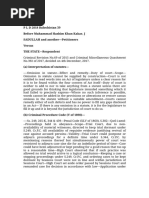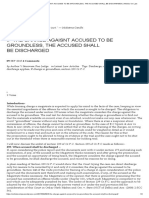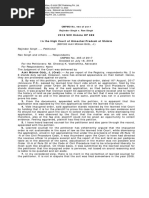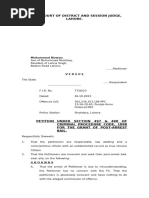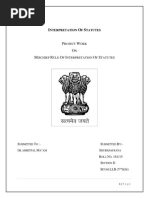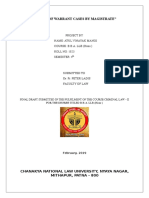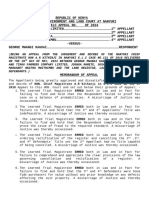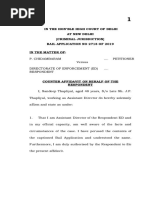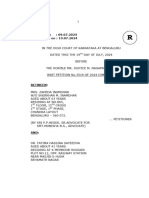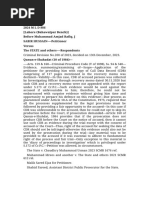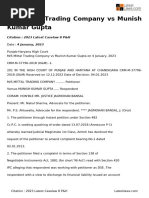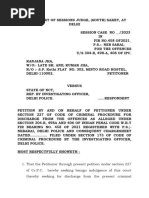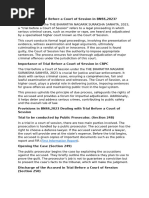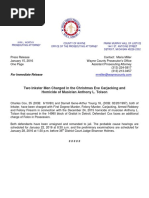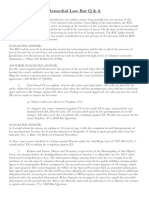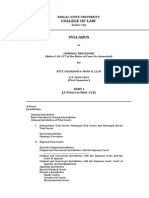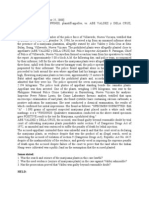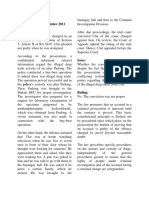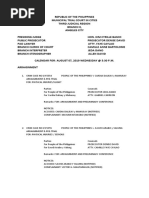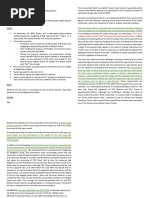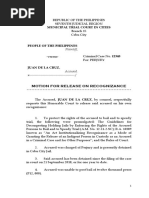Shamin 249a
Shamin 249a
Uploaded by
Adeel MaqsoodCopyright:
Available Formats
Shamin 249a
Shamin 249a
Uploaded by
Adeel MaqsoodCopyright
Available Formats
Share this document
Did you find this document useful?
Is this content inappropriate?
Copyright:
Available Formats
Shamin 249a
Shamin 249a
Uploaded by
Adeel MaqsoodCopyright:
Available Formats
IN THE COURT OF XXIX JUDICIAL
MAGISTRATE KARACHI AT WEST
2834/2022
Muhammad Shamim
………………………….APPLICANT/ACCUSED
Versus
State ………………..……….RESPONDENT
FIR 786/2022
P.S Manghopir
U/S:
---------------------------------------------------------------------
WRITTEN ARGUMENTS ON BEHALF OF
ACCUSED
---------------------------------------------------------------------
With utmost obeisance and deference the following written arguments
are submitted before this worthy Court in support of Application filed
under section 249-A Code of Criminal Procedure,1898:
1. That, the intention of legislature behind the provision of Section
249-A is not to undermine or frustrate the trial process rather it
serves as a safeguard against baseless prosecutions, ensuring
that the accused ins not subjected to the rigors of a full trial
when there is evidently no case to answer.
2. That, the bare perusal of the section 249-A reveals that law
permits the exercise of powers "at any stage of the case" without
specifying a particular stage. The words “at any stage” used in
both the sections include the stages before or after framing of
the charge or after recording of some evidence.6 The only
condition required to be fulfilled is the adherence to the principle
of audi alteram partem, ensuring both parties are heard and
afterwards if the court considers that there is no probability of
the conviction of the accused, it may take appropriate action.
[Reliance is placed on Para 3 of 2024 PLD SC 273]
3. That, it is a settled principle of law that in normal
circumstances, full-fledged trial has to be conducted providing
fair opportunities to the prosecution to prove evidence. However,
departure can be made from the settled practice when
"Extraordinary circumstances" are shown. The extraordinary
circumstances means and includes inability of prosecution to
collect incriminating evidence during the course of investigation
sufficient to record conviction.
4. That, even if the facts alleged by the prosecution are taken to
be true on their face value, they do not make out/constitute the
commission of any offence by the accused.
5. That, there is no evidence or incriminating material supporting
the alleged offence.
6. That, the evidence gathered is insufficient for a conviction, even
if presented at trial.
7. That, the existing prosecution evidence does not support a
conviction, and any additional evidence is unlikely to strengthen
the case against the accused.
8. That, Section 249-A relieves the Magistrate from necessity of
going on with the trial, if from the evidence on record, he is
convinced that a criminal charge cannot be sustained and there
is no probability of the accused being convicted of any offence
the language in which this section is couched makes it clear that
the Magistrate has got powers to acquit the accused even before
any witness is examined, if from the material placed on record
he is satisfied that the charge is groundless.
[Reliance is placed on Para 4 of 1991 P. Cr. L J 963 Karachi]
9. That, the allegations leveled in the FIR are false, frivolous,
baseless, flimsy and concocted and the applicant/accused has no
concern whatsoever with the commission of the said offence.
10. That, the prosecution has badly failed to produce evidence
before this Hono’able Court despite number of opportunities has
been given to the prosecution but failed to produce
evidence/witness before this Hon’ble Court.
11. That, in view of the facts available on the prosecution
record, there is no justification of continuing the process of case.
These are the valid and sufficient grounds of abusing court
process and wastage of precious time of the court.
12. That, the trial court is vested with the powers U/S 249-A
of Code of Criminal Procedure Code, 1898 to acquit accused after
hearing the parties and material produced before it in a speedy
manner. If charge against the accused is groundless and
prosecution was not likely to succeed in bringing home guilt
against the accused.
13. That, there are two ingredients of U/S 249-A Cr.PC, one is
when the charge has become groundless and the second when
there is no probability of conviction of accused and in the instant
matter both the ingredients are existing, hence the instant
prosecution case is not proceed able in the light of section 249-A
Cr.P.C.
14. That, there is no cavil to the proposition that by enacting
section 249-A Cr.P.C, the legislature provided power to acquit an
accused at any stage of the case if, after hearing the prosecutor
and the accused and for the reasons to be recorded it considers
that the charge is groundless or that there is no probability of the
accused being convicted of any offence.
15. That, Applicant/Accused is facing the agony of trial and
there is no chance of conviction of the Applicant/ Accused.
16. That, it is settled principle of law that when it is revealed from
the face of record and on the basis of evidence or material
collected during the court of investigation, there exists no
evidence or circumstances sufficient to prove the guilt of
accused then the trial would be merely an abuse of process of
law and the trial court has to exercise the powers vested in it
under section 249-A Cr.PC to save the accused from the agony
of futile trial. Hence, this case is fit for acquittal of the accused
as from the contents narrated by the complainant in FIR does
not constitute any offence against the accused
In view of above submissions, it is most humbly prayed that the
accused/Applicant/Accused may graciously be acquitted from the
charge under section 249-A Cr.P.C, in the best interest of justice.
KARACHI
DATED: 21.11.2024 ADVOCATE FOR ACCUSED
You might also like
- Application for Hard DiscDocument12 pagesApplication for Hard DiscHardik RathodNo ratings yet
- Procedure Code For Summons CasesDocument8 pagesProcedure Code For Summons CasesOnindya MitraNo ratings yet
- 2-Application For Discharge in Cases - by Sri K Srinivasa RaoDocument10 pages2-Application For Discharge in Cases - by Sri K Srinivasa Raowonchanohumtsoe2766No ratings yet
- P L D 2018 Balochistan 39 (1)Document7 pagesP L D 2018 Balochistan 39 (1)sirwaseem97No ratings yet
- Discharge ApplicationDocument27 pagesDischarge ApplicationSudhir SinhaNo ratings yet
- IF THE CHARGE AGAISNT ACCUSED TO BE GROUNDLESS, THE ACCUSED SHALL BE DISCHARGED - Articles On LawDocument3 pagesIF THE CHARGE AGAISNT ACCUSED TO BE GROUNDLESS, THE ACCUSED SHALL BE DISCHARGED - Articles On LawToheedullahNo ratings yet
- J 2018 SCCr213 122450 1 2Document2 pagesJ 2018 SCCr213 122450 1 2abhishekrana2782003No ratings yet
- 2 Syam Kumar Workshop On Applications On Discharge of AccusedDocument10 pages2 Syam Kumar Workshop On Applications On Discharge of AccusedAshok tiwariNo ratings yet
- Application For Acquittal of Abdullah in Magistrate CourtDocument3 pagesApplication For Acquittal of Abdullah in Magistrate CourtMalik Falak SherNo ratings yet
- POST ARREST BAIL RIZWANDocument5 pagesPOST ARREST BAIL RIZWANMan GeeNo ratings yet
- application 3Document2 pagesapplication 3GHOST PERSONNo ratings yet
- Crl.p. 238 2024Document6 pagesCrl.p. 238 2024Ali AlviNo ratings yet
- Finding of The Civil Court Makes Substratum of The Criminal Complaint Vanish Against Any Person and The Criminal Proceedings Qua Him Are Liable To Be QuashedDocument10 pagesFinding of The Civil Court Makes Substratum of The Criminal Complaint Vanish Against Any Person and The Criminal Proceedings Qua Him Are Liable To Be Quashedkunal singhNo ratings yet
- 249-A Dismissal ofDocument3 pages249-A Dismissal ofAhsan Naqvi100% (1)
- P W O M R O I O S: Roject ORK N Ischief ULE F Nterpretation F TatutesDocument16 pagesP W O M R O I O S: Roject ORK N Ischief ULE F Nterpretation F TatutesShubham RanaNo ratings yet
- Trials of Warrant Cases by MagistrateDocument12 pagesTrials of Warrant Cases by MagistratePriyesh GauravNo ratings yet
- Section 482: View Complete DocumentDocument2 pagesSection 482: View Complete DocumentpuneetastroNo ratings yet
- Summon and WarrantDocument2 pagesSummon and WarrantTarakeswar GhoraiNo ratings yet
- Summon and WarrantDocument2 pagesSummon and WarrantTarakeswar GhoraiNo ratings yet
- Motion For Reconsideration Replevin CaseDocument6 pagesMotion For Reconsideration Replevin Casemaycil ambagNo ratings yet
- 498a FIR Quashed 2023Document10 pages498a FIR Quashed 2023vishaldhingra555No ratings yet
- Wasim EditDocument4 pagesWasim Editryanmalik222No ratings yet
- Syed TAHIR HUSSAIN MEHMOODI VS Agha Syed LIAQAT ALI, 2014 SCMR-SUPREME-COURT 637 (2014)Document4 pagesSyed TAHIR HUSSAIN MEHMOODI VS Agha Syed LIAQAT ALI, 2014 SCMR-SUPREME-COURT 637 (2014)shani2010No ratings yet
- CRPCDocument10 pagesCRPCSanaur RahmanNo ratings yet
- Trial: RULE 119Document39 pagesTrial: RULE 119Carmi RosNo ratings yet
- crl.p._894_l_2023Document4 pagescrl.p._894_l_2023lakowe7996No ratings yet
- Memorandum of AppealDocument44 pagesMemorandum of Appealmaureennjoki347No ratings yet
- e8f33bc07fa87f95bbfd02a14197a1e3d7dee8578beed448fbdc8096f9787a051736498589Document22 pagese8f33bc07fa87f95bbfd02a14197a1e3d7dee8578beed448fbdc8096f9787a051736498589cneha4466No ratings yet
- VD Solomon Vs V Solomon Mary and Ors 13072003 APHA031143COM950138Document4 pagesVD Solomon Vs V Solomon Mary and Ors 13072003 APHA031143COM950138jagan kilariNo ratings yet
- Asad Bail 9cDocument5 pagesAsad Bail 9cKamran ZaibNo ratings yet
- ED's Counter-Affidavit in Chidambaram's Bail PleaDocument62 pagesED's Counter-Affidavit in Chidambaram's Bail PleaThe Wire100% (1)
- CRPC PresentationDocument16 pagesCRPC PresentationShubham RanaNo ratings yet
- Ummed Puri and Ors Vs State of Rajasthan On 2 May 2002Document5 pagesUmmed Puri and Ors Vs State of Rajasthan On 2 May 2002BENE FACTORNo ratings yet
- 2022 S C M R 998Document5 pages2022 S C M R 998MCTC TTSinghNo ratings yet
- Examination of Accused and Framing of ChargesDocument7 pagesExamination of Accused and Framing of ChargesJam Siraj SangiNo ratings yet
- Notices. - The Trial Shall Commence Within Thirty (30) Days FromDocument10 pagesNotices. - The Trial Shall Commence Within Thirty (30) Days FromVanya Klarika NuqueNo ratings yet
- wp3519 24 19 07 2024 1 551159Document41 pageswp3519 24 19 07 2024 1 551159somattorneyNo ratings yet
- W.P. (C) No. 4888/2023: 1Document9 pagesW.P. (C) No. 4888/2023: 1abhigoodnotesNo ratings yet
- 2024 M L D 886Document5 pages2024 M L D 886maharcreativity97No ratings yet
- Ordjud 12watermark 1466656Document10 pagesOrdjud 12watermark 1466656Sunil KulkarniNo ratings yet
- Bail Application 23 - 1 (A) Waqar AhmedDocument3 pagesBail Application 23 - 1 (A) Waqar AhmedLawyer TeequeNo ratings yet
- Accused Added Under Section 319 of The CR.P.C Cannot Avail of The Remedy of Discharge, Rules The Supreme CourtDocument11 pagesAccused Added Under Section 319 of The CR.P.C Cannot Avail of The Remedy of Discharge, Rules The Supreme CourtLive Law100% (1)
- 2023 Latest Caselaw 8 P&HDocument24 pages2023 Latest Caselaw 8 P&HAishwarya JadavNo ratings yet
- J 1997 SCC OnLine AP 455 1998 1 ALD 607 1998Document10 pagesJ 1997 SCC OnLine AP 455 1998 1 ALD 607 1998Arunjeet SinghNo ratings yet
- CRLP3918 15 26 08 2015Document6 pagesCRLP3918 15 26 08 2015naveen KumarNo ratings yet
- Project - Proceedings-Civil - Criminal Suit-21-06-23-FINALDocument15 pagesProject - Proceedings-Civil - Criminal Suit-21-06-23-FINALManisha VermaNo ratings yet
- Conformation of Sentence of Death by High Court, Awarded by Sessions Court Criminal Procedure CodeDocument14 pagesConformation of Sentence of Death by High Court, Awarded by Sessions Court Criminal Procedure CodeRishabh TiwariNo ratings yet
- Mbatha V Fides Kenya Limited (Cause 262 of 2018) (2023) KEELRC 1276 (KLR) (26 May 2023) (Ruling)Document4 pagesMbatha V Fides Kenya Limited (Cause 262 of 2018) (2023) KEELRC 1276 (KLR) (26 May 2023) (Ruling)Rickcard BettNo ratings yet
- KV Baby v. Food Inspecter PDFDocument8 pagesKV Baby v. Food Inspecter PDFMurali ChandanaNo ratings yet
- LEGAL OPTIONS FOR AN "INNOCENT PERSON" WHO IS ACCUSED OF HAVING COMMITTED A CRIMINAL OFFENCE - Indian ConsitutionDocument7 pagesLEGAL OPTIONS FOR AN "INNOCENT PERSON" WHO IS ACCUSED OF HAVING COMMITTED A CRIMINAL OFFENCE - Indian ConsitutionBhuwaneshwar BarethNo ratings yet
- Auman Vs EstenzoDocument3 pagesAuman Vs Estenzoana ortizNo ratings yet
- J 2019 SCC OnLine Del 9839 1983142 Klsacin 20240919 155639 1 4Document4 pagesJ 2019 SCC OnLine Del 9839 1983142 Klsacin 20240919 155639 1 4tanmayNo ratings yet
- Bail After Arrest 489F Sessions JudgeDocument5 pagesBail After Arrest 489F Sessions JudgeHassan KhalilNo ratings yet
- Rajesh Agarwal V StateDocument11 pagesRajesh Agarwal V StateChaitanya AroraNo ratings yet
- Order Sheet: in The Lahore High CourtDocument7 pagesOrder Sheet: in The Lahore High CourtUmair GillNo ratings yet
- Discharge ApplicationDocument27 pagesDischarge ApplicationSudhir SinhaNo ratings yet
- AnswerDocument23 pagesAnswernishugandhi275No ratings yet
- Order 2Document20 pagesOrder 2tavish_cnluNo ratings yet
- 1.Conditional Bail- Scope and LimitsDocument27 pages1.Conditional Bail- Scope and LimitsAdeel MaqsoodNo ratings yet
- Cuddy Law Firm Ai RatesDocument34 pagesCuddy Law Firm Ai RatesAdeel MaqsoodNo ratings yet
- PLD 1987 Lahore 633 561ADocument6 pagesPLD 1987 Lahore 633 561AAdeel MaqsoodNo ratings yet
- 2022LHC26Document13 pages2022LHC26Adeel MaqsoodNo ratings yet
- WP-No.-3011-P2016-by-M.Ayub-Khan.J EduDocument14 pagesWP-No.-3011-P2016-by-M.Ayub-Khan.J EduAdeel MaqsoodNo ratings yet
- Arraignment For Practice CourtDocument3 pagesArraignment For Practice CourtSCSC BIRNo ratings yet
- Anthony L. TolsonDocument1 pageAnthony L. TolsonMichigan NewsNo ratings yet
- People V Ignas Case DigestDocument2 pagesPeople V Ignas Case DigestPouǝllǝ ɐlʎssɐ100% (2)
- Public Prosecutor V Lim Kuan HockDocument5 pagesPublic Prosecutor V Lim Kuan Hockchar yeeNo ratings yet
- Miranda DoctrineDocument3 pagesMiranda DoctrineBeatrice BenoliraoNo ratings yet
- Mix Case LawsDocument6 pagesMix Case LawsAdv Sohail BhattiNo ratings yet
- Questions For CrimPro Mock BarDocument7 pagesQuestions For CrimPro Mock BarNeil AntipalaNo ratings yet
- 1) Arraignment and Entry of Plea - Accused MustDocument10 pages1) Arraignment and Entry of Plea - Accused MustdaryllNo ratings yet
- Manifestation With Urgent Motion To Cancel ArraignmentDocument4 pagesManifestation With Urgent Motion To Cancel ArraignmentAlkaios RonquilloNo ratings yet
- People v. de La CruzDocument1 pagePeople v. de La CruzSei KawamotoNo ratings yet
- C-473-16 TSN 13 December 2023 EditedDocument34 pagesC-473-16 TSN 13 December 2023 EditedJanneth Sanchez-EstebesNo ratings yet
- People vs. PinedaDocument1 pagePeople vs. PinedaTootsie GuzmaNo ratings yet
- LESSON 2 - Juries WorksheetDocument4 pagesLESSON 2 - Juries Worksheetvioletadams2005No ratings yet
- Part VIII. Testimonial Evidence 1Document5 pagesPart VIII. Testimonial Evidence 1Ria Evita RevitaNo ratings yet
- Unit 3 3.2Document5 pagesUnit 3 3.2swalhamuhammed76No ratings yet
- Criminal Procedure Syllabus Tarlac 2018Document60 pagesCriminal Procedure Syllabus Tarlac 2018Wangyu KangNo ratings yet
- People vs. de Los ReyesDocument17 pagesPeople vs. de Los ReyesEarl NuydaNo ratings yet
- People Vs JanuarioDocument9 pagesPeople Vs JanuarioGiovanni Christian LadinesNo ratings yet
- Case Digest People vs. ValdezDocument3 pagesCase Digest People vs. Valdezjulandmic967% (3)
- United States v. Anthony Todisco, Anthony Vallone, John Campopiano, Salvatore Sferrazza, Alfonse Zambuto, Leonard Barracano, and David D'Angelo, 667 F.2d 255, 2d Cir. (1981)Document7 pagesUnited States v. Anthony Todisco, Anthony Vallone, John Campopiano, Salvatore Sferrazza, Alfonse Zambuto, Leonard Barracano, and David D'Angelo, 667 F.2d 255, 2d Cir. (1981)Scribd Government DocsNo ratings yet
- People V UlatDocument2 pagesPeople V UlatJohnson YaplinNo ratings yet
- CalendarDocument2 pagesCalendarCamille Anne Roque BartolomeNo ratings yet
- PP Vs Guzon DigestDocument2 pagesPP Vs Guzon Digesthully gullyNo ratings yet
- What We Know About Driver Charged in Deaths of Waltham Officer, National Grid WorkerDocument2 pagesWhat We Know About Driver Charged in Deaths of Waltham Officer, National Grid WorkerBoston 25 DeskNo ratings yet
- WAIVER OF INDICMENT - CHARLIE SHREM (09-04-2014) DOCUMENT 47, Cr. 243 (JSR)Document1 pageWAIVER OF INDICMENT - CHARLIE SHREM (09-04-2014) DOCUMENT 47, Cr. 243 (JSR)Dan StuckeyNo ratings yet
- Arraignment and Plea TranscriptDocument31 pagesArraignment and Plea TranscriptavrilleNo ratings yet
- United States v. James David Nichols, United States of America v. James David Nichols, 438 F.3d 437, 4th Cir. (2006)Document11 pagesUnited States v. James David Nichols, United States of America v. James David Nichols, 438 F.3d 437, 4th Cir. (2006)Scribd Government DocsNo ratings yet
- GR 109773 - March 30, 2000 Y - S, J.: Doctrine: People of The Philippines v. BaseDocument2 pagesGR 109773 - March 30, 2000 Y - S, J.: Doctrine: People of The Philippines v. BaseKenneth TaguibaNo ratings yet
- Trial of Summon Cases Under CRDocument3 pagesTrial of Summon Cases Under CRRajshree ShekharNo ratings yet
- Municipal Trial Court in Cities: Motion For Release On RecognizanceDocument4 pagesMunicipal Trial Court in Cities: Motion For Release On RecognizanceMaria Leonora TheresaNo ratings yet



